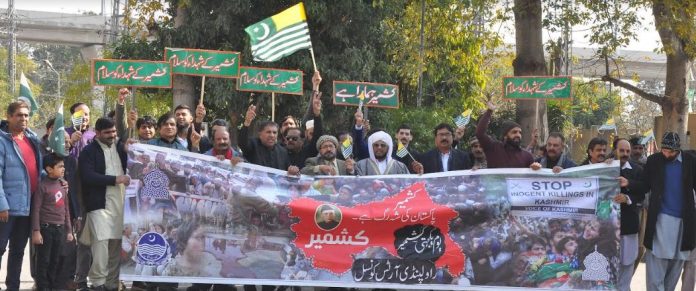Sayyidah Kausar Fatima
Kashmir Solidarity Day is a reaffirmation of the indomitable spirit of Kashmiris and unwavering support to our Kashmiri brethren in their just struggle for the inalienable right to self-determination. It serves as an annual reminder of the prolonged conflict in Indian Illegally Occupied Jammu and Kashmir (IIOJK), where the struggle for self-determination has left an indelible mark on the lives of its residents. The resilience exhibited by them is awe-inspiring.
Indian Illegally occupied Jammu and Kashmir (IIOJK), often romanticized for its breathtaking landscapes has been marred by conflicts for decades. This dispute with its roots in the denial of self-determination to Kashmiris since 1947, has witnessed brutal Indian repression, human rights abuses and a complex geo-political landscape. For the Indians, the endgame is consummating the settler-colonial occupation. For the Kashmiris, the goal is to resist and uproot it. It is a resistance of unfortunate people pushed to the wall by a hegemonic power. India’s continuing need for social, political, and militaristic machinations in Kashmir since its occupation in 1947 has neither diminished despite its decades of political maneuvering and military repression or even after pouring billions in developmental aid;nor has India’s awe-inspiring rise to the status of an economic superpower made a dent in the resistance narrative. They have been able to subdue the resistance narrative yet have been unable to erase it.
Undeniably, Kashmir’s history is awash with painful memories and tragedies. The annulment of Articles 35(A) and 370 added complexities to the Kashmir dispute, plunging the region into perpetual turmoil. This move not only altered the independent status of Jammu and Kashmir but also exacerbated demographic disparities, particularly impacting the Muslim majority regions
under Indian control. Despite numerous discussions and dialogues over the past seventy-six years, the conflict persists due to India’s unyielding strategy, an uncompromising approach and a lack of trust between the two neighboring nations. The UN Secretary-General, on 8 August 2019, declared that the United Nations position remained that the Jammu & Kashmir dispute should be resolved “on the basis of the UN Charter, UN Resolutions and bilateral agreements”. This constituted reaffirmation of the UN’s position on Jammu & Kashmir and was a clear rejection of India’s unilateral measures of and after 5 August 2019. The Security Council met three times to consider the situation arising from India’s unilateral measures.
The judgement by the Indian Supreme Court of the BJP_RSS Government’s unilateral abrogation of Article 370 has no legal or political impact on the disputed status of Jammu & Kashmir since the Security Council has explicitly declared in Resolutions 91 and 122 that no unilateral steps taken by any of the parties to the dispute would constitute a “final disposition” of the State of Jammu & Kashmir. Certainly, the Parliament of a State in occupation of a disputed territory does not have the legal jurisdiction or right to adopt decisions to change the status, institutions or governance of the disputed territory. The unilateral endorsement of the Modi Government’s illegal measures by the Indian Supreme Court in no way compromises the provisions and prescriptions of the Security Council as contained in its resolutions. Moreover, the unilateral measures taken by the Indian government were ultra vires to its own Constitution, which required the consent of the (now dissolved) Jammu & Kashmir “Legislative Assembly”. This is a clear example of the Indian judiciary’s surrender of its legal and ethical standards to the demands of the Hindutva extremists ruling India today.
Jammu and Kashmir remains the most militarized region in the worldand hence, dispute calls for a systematic resolution in line with UN Security Council Resolutions to prevent further escalation. The conflict’s protraction
emphasizes the urgent need for international intervention to facilitate a comprehensive and lasting solution. The international community must play a pivotal role in urging both India and Pakistan to engage in sincere dialogue, fostering an atmosphere of trust and cooperation. A resolution aligned with UN resolutions is crucial not only for the stability of the South Asian region but also for the wellbeing and self-determination of the people of Kashmir.
*******

















